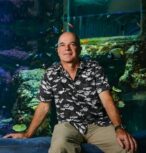DNA reveals the past and future of coral reefs
New DNA techniques are being used to understand how coral reacted to the end of the last ice age in order to better predict how they will cope with current changes to the climate. James Cook Univer

From 2005 to 2022, the main node of the ARC Centre of Excellence for Coral Reef Studies was headquartered at James Cook University in Townsville, Queensland (Australia)








Abstract:
It is a little over a decade since research commenced into the effects of anthropogenic ocean acidification on marine fishes. In that time, we have learned that projected end-of-century CO2 levels can affect the physiology, growth and survival of some species, but not others. There are also wide-ranging effects on behaviour that could alter the performance and survivorship of some species. However, these effects are context and species specific, and the results depend on how experiments are done. In a provocative article published in Nature, Clark et al. claimed that ocean acidification does not impair the behaviour of coral reef fishes and that previous studies are not repeatable. In this talk I outline the overwhelming evidence from a decade of research showing that elevated CO2 can affect the behaviour of a wide variety of fishes, including coral reef fishes, and I describe how methodological differences explain why different studies yield different results. I conclude by considering the possible effects of ocean acidification on reef fishes compared with other, more immediate, threats from climate change.
Biography:
Professor Philip Munday is a Chief Investigator and Reef Research Leader in the ARC Centre of Excellence for Coral Reef Studies at James Cook University in Townsville. He has broad interests in the ecology and evolution of reef fishes. His primary research focuses on predicting the impacts that climate change and ocean acidification will have on populations and communities of marine fishes, both directly through changes in the physical environment and indirectly through effects on coral reef habitat. Using a range of laboratory and field-based experiments the research group he leads is investigating the effects of climate change on fish populations and testing their capacity for acclimation and adaptation to a rapidly changing environment.
New DNA techniques are being used to understand how coral reacted to the end of the last ice age in order to better predict how they will cope with current changes to the climate. James Cook Univer
A new study on the effects of climate change in five tropical countries has found fisheries are in more trouble than agriculture, and poor people are in the most danger. Distinguished Profess
James Cook University researchers have found brightly coloured fish are becoming increasingly rare as coral declines, with the phenomenon likely to get worse in the future. Christopher Hemingson, a
Researchers working with stakeholders in the Great Barrier Reef region have come up with ideas on how groups responsible for looking after the reef can operate more effectively when the next bleaching
Abstract: As marine species adapt to climate change, their heat tolerance will likely be under strong selection. Individual variation in heat tolerance and its heritability underpin the potential fo
Abstract: The Reef Ecology Lab in KAUST’s Red Sea Research Center explores many aspects of movement ecology of marine organisms, ranging from adult migrations to intergenerational larval dispersal
Abstract: Macroalgal meadows are a prominent, yet often maligned component of the tropical seascape. Our work at Ningaloo reef in WA demonstrate that canopy forming macroalgae provide habitat for ad
Abstract: Sharks are generally perceived as strong and fearsome animals. With fossils dating back at least 420 million years, sharks are not only majestic top predators but they also outlived dinosa
Abstract: Connectivity plays a vital role in many ecosystems through its effects on fundamental ecological and evolutionary processes. Its consequences for populations and metapopulations have been
Abstract: Evolution of many eukaryotic organisms is affected by interactions with microbes. Microbial symbioses can ultimately reflect host’s diet, habitat range, and even body shape. However, how
Abstract: The past few years have seen unprecedented coral bleaching and mortality on the Great Barrier Reef (GBR) but the consequences of this on biodiversity are not yet known. This talk will expl